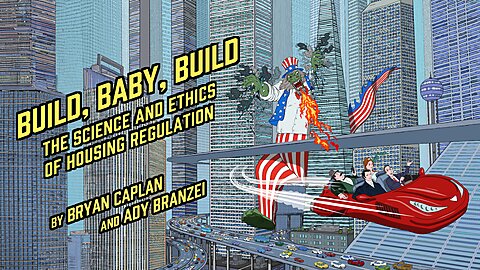“How should government fight poverty?” It hardly seems like a loaded question, but it contains a strong sequential insinuation. Namely: Prior to government lifting a finger, a severe poverty problem exists. Then a helpful government arrives on the scene to fight this pre‐existing problem. Which swiftly leads to a debate about the best way for government to play the hero. Should it provide education and job training? Subsidize food and health care? Or just hand out cash?
To avoid this sequential insinuation, we have to rephrase the question. In lieu of “How should government fight poverty?” I propose: “How should government change policy to reduce poverty?”
This question remains open to standard redistributive responses. But changing the wording also allows for the possibility that existing government policy is a major cause of poverty. If so, the simplest way for government to reduce poverty is to stop making it worse. Talking about “fighting poverty” pre‐anoints government as the hero of the story when the truth could be quite the reverse.
My new Build, Baby, Build: The Science and Ethics of Housing Regulation highlights one of the main ways that modern governments do in fact sharply increase poverty. Namely: By slashing the supply — and thereby raising the price — of the basic necessity of shelter.
A wide range of regulations make it hard for developers to build tall buildings, multifamily housing, and even dense single‐family housing. While this means more expensive housing for everyone, the poor suffer extra, for two reasons.
First, the poor spend a larger share on shelter. For the richest quintile of Americans, it’s 18 percent. For the poorest quintile, it’s 25 percent.
Second, renters are poorer than owners. To be clear, lower housing prices aren’t always bad for owners; after all, they may hope to upgrade to nicer place, or want their kids to be able to afford to live in their vicinity. But cheaper housing is almost automatically good for renters.
The preceding two arguments boil down to simple arithmetic. If you dig deeper, you’ll find two more ways that housing deregulation helps the less fortunate.
First, as Nobel laureate Angus Deaton and Anne Case point out in their Deaths of Despair and the Future of Capitalism, America’s non‐college males have been doing especially poorly in recent decades. One common remedy is to use protectionism to revive US manufacturing, but the numbers just don’t add up. Housing deregulation is a far more realistic remedy because (a) a large majority of workers in construction are non‐college males, (b) 11 million people already work in this industry, and (c) most people would gladly upgrade to a bigger home if the price were right. Even modest housing deregulation would therefore create millions of new well‐paid jobs for non‐college males.
Second, building off the work of Peter Ganong and Daniel Shoag, Build, Baby, Build shows that housing regulation also reduces the upward mobility of the poor. Decades ago, when housing prices were much lower — and more nationally uniform — poor Americans had a clear path to a better life: move to a higher‐wage part of the country. Steinbeck’s Grapes of Wrath notwithstanding, this strategy worked well. Now, however, poor Americans who try this route typically find that the extra housing cost in high‐wage regions eats up more than 100 percent of the wage gain. Lifting yourself up by your own bootstraps is still possible, but used to be quite a bit easier.
Five years ago, I had a debate on poverty policy with my friend, economist David Balan. He broadly agreed with me on the merits of housing deregulation and acknowledged that high housing prices were especially bad for the poor. Yet Balan insisted on purely semantic grounds that housing deregulation doesn’t count as “poverty policy.” Unless you favor government redistribution, your preferred poverty policy is, perforce, no policy at all.
My reply: Anything that reduces poverty counts as poverty policy! Indeed, if you want to help the poor, Effective Altruism 101 urges us to start by adopting all of the policies that cost less than nothing. Shackling construction is a prime example of such a policy. After all, housing regulation hurts the poor by burning taxpayer resources to impede wealth creation. Harm fueled by waste and more waste.
Housing deregulation isn’t just one sort of poverty policy. It is the best sort of poverty policy. Instead of letting government tax the rest of society and hoping that the benefits exceed the costs, housing deregulation shows government a mirror. “You’re not the hero of this story. At best, you can become a repentant villain. Want to help the poor? Then stop hurting them.”

